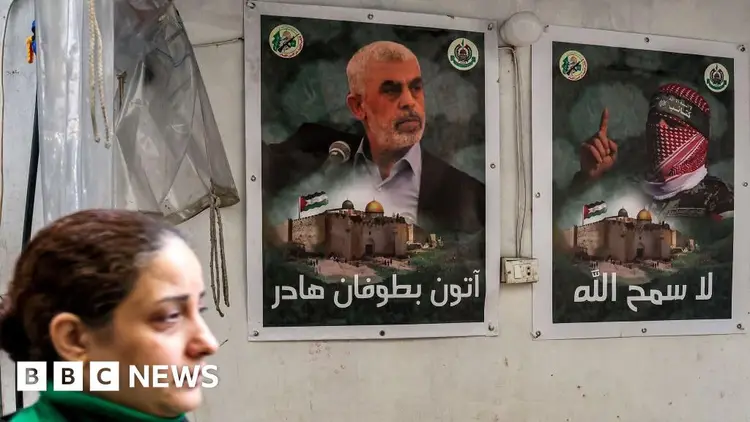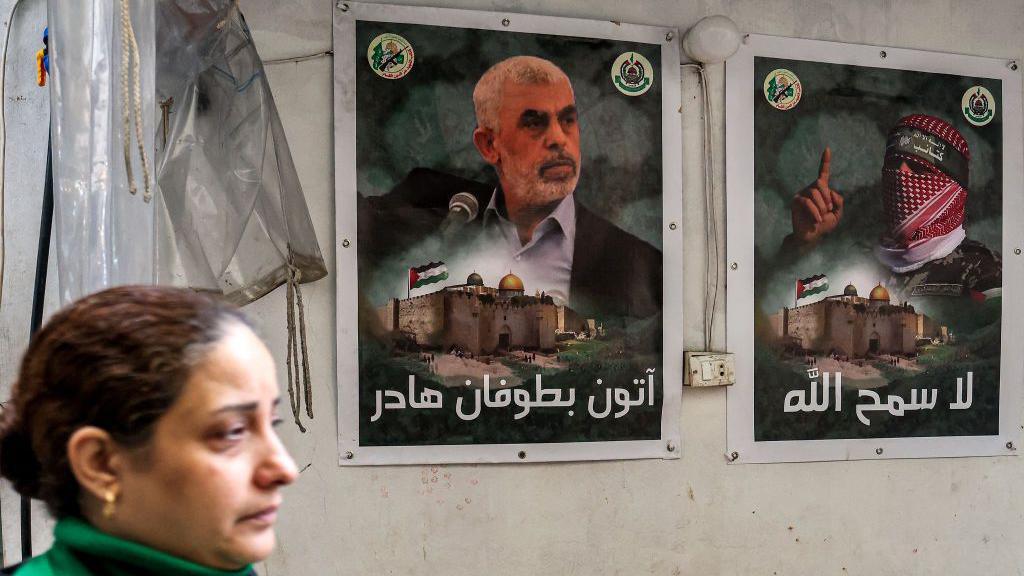Yahya Sinwar, leader of Hamas, killed by Israeli forces in Gaza

Sinwar served as the head of Hamas.
Israel has confirmed that Yahya Sinwar, the head of Hamas, has been killed by its soldiers in southern Gaza.

Sinwar had been at the helm of the militant group in Gaza since 2017 and was labeled by Israel, the US, and the UK as the chief architect of the October 7 assaults. During these attacks, Hamas militants killed approximately 1,200 individuals in Israel and captured 251 hostages.
Israeli Prime Minister Benjamin Netanyahu stated, "Today, we fulfilled our promise and addressed this matter with him."
The Israeli military reported that Sinwar was one of three militants who were killed on Wednesday during an operation targeting a building in Rafah, believed to be used by high-ranking members of Hamas.
It was noted that there were no indications of hostages being present at the location. Earlier reports suggested that Sinwar might use Israeli hostages as a form of protection during his travels.
Israeli soldiers observed three armed men moving between houses, according to Daniel Hagari, a spokesperson for the Israel Defense Forces (IDF). When shots were fired at them, the men scattered, and Sinwar went into a building by himself.
A drone captured footage of him sitting in a chair, which he then attempted to hit with a piece of wood, Hagari mentioned. When soldiers arrived at the location, they discovered Sinwar equipped with a vest, a firearm, and 40,000 shekels (approximately £8,240).
Lieutenant Colonel Hertzi Halevi, the head of the IDF, stated, "We promised we would reach him, and we followed through. The world is a safer place without him."
The confirmation of his death took several hours as Israel was in the process of checking dental records and fingerprints. Having spent many years in an Israeli prison, Israel likely had his genetic information on record.
Previously, disturbing images shared on the internet seemed to depict a lifeless body that looked like Sinwar, found among debris with a significant head wound.
The IDF indicated at that moment that it was possible he had died, but they preferred not to announce his death too soon, as they had been tracking him for more than a year.
Speaking to the families of the hostages still in Gaza, Netanyahu assured them that Israel would "spare no effort to ensure that every single one of your loved ones returns home safely, because they are also dear to us."
Netanyahu informed the people of Gaza that Sinwar has "ruined your lives."
"Hamas will no longer have authority over Gaza," he stated. "This marks the start of a new era following Hamas, and it's your chance, the people of Gaza, to liberate yourselves from its oppression."
The death of Sinwar follows the killing of Hamas's political leader, Ismail Haniyeh, who was killed in an Israeli air raid in Tehran back in July. After that, Sinwar stepped up to take over as the overall leader of Hamas, filling the position that Haniyeh once held.
Sinwar, often referred to as Abu Ibrahim, was born in Khan Younis in southern Gaza in 1962. At the age of 19, he was first taken into custody by Israel due to his involvement in "Islamic activities."
At the age of 25 during the late 1980s, he established the Hamas security organization known as al-Majd. This group was responsible for dealing with individuals accused of moral violations as well as those thought to be working with Israel.
In 1988, he received a sentence of four life sentences in Israel. However, in 2011, he was one of the 1,027 inmates freed in a swap for Gilad Shalit, an Israeli soldier who had been held by Hamas in Gaza for more than five years.
The confirmation of Sinwar's death came from dental records and fingerprint analysis.
Israel's foreign minister, Israel Katz, described the elimination of Sinwar as a major military and ethical victory.
Defense Minister Yoav Gallant stated that Sinwar is part of a continued pattern of removals.
Sinwar met his end in a state of violence, being pursued and under constant threat. He didn't die as a leader; rather, he passed away as someone focused solely on his own interests.
"This is a straightforward statement to everyone who opposes us."
Hamas has not made any statements regarding Sinwar's death, and it's unclear who might succeed him.
US President Joe Biden praised Netanyahu during a phone conversation, stating that it was "a positive day for Israel, the United States, and the entire world."
He mentioned that Sinwar's death demonstrated, "once more, that terrorists around the globe cannot evade justice."
David Petraeus, the former director of the CIA, shared with BBC Radio 4 that the death of Sinwar carries more significance than that of Osama Bin Laden in 2012. He noted that both events are not only highly symbolic but also have major operational implications, especially since Sinwar was the top leader of Hamas.
Israel's publicly declared objective for its invasion of Gaza following the attacks on October 7 was to eliminate Hamas.
Sir John Sawers, who led the UK's foreign intelligence agency MI6 from 2009 to 2014, stated that Netanyahu is likely to capitalize on his current edge.
In an interview with BBC Radio 4's World Tonight program, he stated, "Currently, Netanyahu believes he holds a significant upper hand not only against Hamas but also over Hezbollah, and Iran is also struggling."
"I believe his natural inclination will be to capitalize on that lead."
Sir John expressed his belief that the Israeli Prime Minister is likely to aim for the majority of the nation’s military objectives before the inauguration of the next US president in January.
Residents of Sderot, Israel, have gathered in the streets to celebrate the death of Sinwar.
The Prime Minister of Britain, Sir Keir Starmer, stated that the UK would not express sorrow over Sinwar's passing. He also urged for the release of all hostages taken by Hamas and emphasized the importance of striving for lasting peace in the Middle East.
French President Emmanuel Macron described the death as a chance to resolve the ongoing conflict in the Middle East. In contrast, Italy's Prime Minister Giorgia Meloni stated that it marked the beginning of a "new chapter" in the war.
The health ministry in Gaza, controlled by Hamas, reports that approximately 42,500 people have lost their lives and over 99,000 have been injured in the ongoing conflict. The ministry does not specify whether these figures include civilians or fighters.
Approximately 101 hostages are believed to be alive in Gaza. The families of the seven American hostages released a joint statement urging that "everyone involved needs to quickly take action" to secure their return "before it's too late."
In his statements, Netanyahu acknowledged that the conflict has been "challenging and is taking a heavy toll on us," but emphasized, "Today we reiterated the consequences for those who attack us."

























































